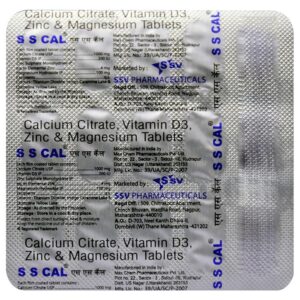VIT D3 + CALCIUM
Vit D3: Vitamin D3, also known as cholecalciferol, is a form of vitamin D that is essential for maintaining healthy bones and teeth. It is produced in the skin when exposed to sunlight and can also be obtained through certain foods or supplements.
The main function of Vitamin D3 is to regulate the absorption of calcium and phosphorus in the body. It does this by promoting the synthesis of proteins that help transport these minerals from the intestines into the bloodstream. In addition to its role in bone health, Vitamin D3 also plays a part in immune function, cell growth, and reducing inflammation.
Vitamin D3 is commonly prescribed to treat and prevent vitamin D deficiency. It may be recommended for individuals who have limited sun exposure, older adults, breastfed infants, and people with certain health conditions that hinder vitamin D absorption. It may also be used as an adjunct treatment for osteoporosis.
The recommended daily dose of Vitamin D3 can vary depending on age, sex, and individual needs but is usually in the range of 600-800 international units (IU) for most adults. Higher doses may be prescribed for people with severe vitamin D deficiency or specific medical conditions under the guidance of a healthcare professional.
Side effects of Vitamin D3 are generally rare when taken within recommended doses. However, excessive intake of vitamin D3 can lead to symptoms such as nausea, vomiting, constipation, weakness, and increased thirst. Very high doses for extended periods may potentially cause elevated calcium levels in the blood (hypercalcemia), leading to symptoms like bone pain, kidney problems, and kidney stones.
It is important to note that vitamin D3 supplements should be taken under the guidance of a healthcare professional, especially for people with certain medical conditions or those taking other medications that may interact with vitamin D3.
Calcium: Drug: Calcium
Use: Calcium is a mineral supplement used to treat or prevent calcium deficiency. It is primarily used to maintain strong bones and teeth and to ensure proper functioning of muscles, nerves, and the heart. Calcium is also used in the treatment of conditions like osteoporosis, hypoparathyroidism, and certain types of bone diseases.
Mechanism of Action: Calcium is an essential mineral that plays a crucial role in various physiological processes. It acts as a messenger for intracellular signaling, controlling processes such as muscle contraction, nerve transmission, hormone secretion, and blood clotting. Additionally, calcium provides structural support to bones and teeth. When calcium levels in the blood are low, the body releases parathyroid hormone, which stimulates the release of calcium from bones to maintain normal blood levels.
Dose: The recommended daily dose of calcium depends on age, sex, and specific needs. For adults, the suggested dose is usually between 1000-1300 mg per day. This can be obtained through diet or by taking calcium supplements. It is essential to consult with a healthcare professional to determine the appropriate dose for individual circumstances.
Side Effects: While calcium is generally safe when taken as recommended, high doses or excessive intake can lead to side effects such as constipation, bloating, stomach upset, and kidney stones. Some individuals may also experience allergic reactions or hypersensitivity to calcium supplements. It is crucial to stay within the recommended dosage and inform a healthcare professional if any side effects occur. Calcium supplements may also interfere with the absorption of certain medications, so it is important to inform healthcare providers of all medications being taken.





